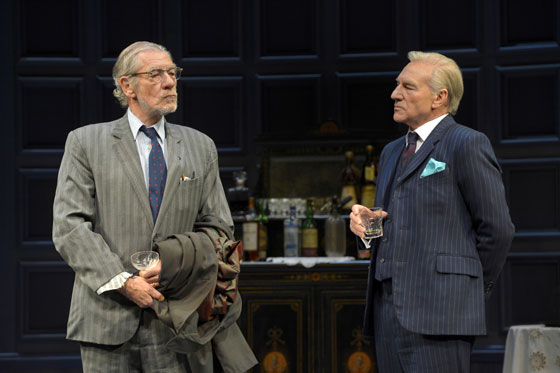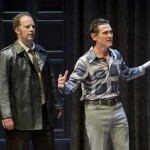(l to r) Legendary actors Ian McKellen and Patrick Stewart star as two writers in a special presentation of the pre-Broadway engagement of Harold Pinter’s No Man’s Land at Berkeley Rep. Photo courtesy of kevinberne.com
NO MAN’S LAND: Drama by Harold Pinter. Directed by Sean Mathias. Berkeley Rep’s, Roda Theatre, 2015 Addison St., Berkeley, CA. (510) 647-2949. www.berkeleyrep.org.
August 11 – 31, 2013
Pinter’s NO MAN’S LAND a brilliant production at Berkeley Rep.
What you read in this first paragraph should not be construed as a negative review of Harold Pinter’s No Man’s Land that received a well deserved spontaneous standing ovation on opening night. Ian McKellen and Patrick Stewart give superb performances handling the nuances of “Pinteresque” infamous pauses written into the text with perfection. Sean Mathias’ meticulous direction demonstrates complete understanding of the author’s idiosyncrasies. However, becoming an aficionado of Pinter’s plays requires learned behavior since his brilliance and intention are often elliptical.
The elliptical nature of his dialog (and often the entire play) is understandable since Pinter was a student/admirer of Samuel Beckett’s obtuse style of writing. There is difficulty separating truth from untruth, myth from reality and past from the present. So it is with No Man’s Land that is in the Bay Area for only 34 performances before mounting the boards on Broadway to play in repertory with Beckett’s Waiting for Godot.
With soft ominous original music (Rob Milburn & Michael Bodeen) wafting through the theatre, a gray aged tree branch is projected on the transparent proscenium arch curtain (Zachary Borovay) that lifts revealing an elegant curved study without books (Stephen Brimson Lewis) furnished only with a well stocked wet bar, one wing-back chair and two antique sitting chairs.
Sitting stoically in the wing chair is an inebriated Hirst (Patrick Stewart) while an equally drunk Spooner (Ian McKellen) stumbling about flooding the stage with dialog interspersed with the expected Pinter pauses. Apparently, you can never be sure, the rich famous man of letters Hirst has been carousing at the Jack Straw Castle and brought back the semi-disheveled failed poet Spooner to his home. Hirst often asks Spooner, “Who are you” or “Do I know you.”
In act one the question of knowing who knows whom is never resolved nor do we get to know the relationship of two men who live with Hirst. One is the smaller talkative Foster (Billy Crudup) and the other the burly taciturn Briggs (Shuler Hensley). They resent the “lower class” Spooner for invading Hirst’s posh territory. The liquor flows for Hirst and Spooner. Spooner adroitly avoids being thrown out and Hirst falls to the floor and as he crawls out the only door, lights fade to black. It is the best non-verbal exit line yet devised. End of Act one.
In the intermission the audience conversations were muted with questions about what was going on in the play. Things clear up, sort of, in act two as Pinter adds back story for the characters. It is morning and a sober Spooner has been inexplicably locked into the room during the night. Why is never answered. When Briggs brings Spooner a fancy breakfast including a bottle of champagne, Briggs become talkative describing how
he and Foster became partners (a suggestion as lovers) with Foster moving in as Hirst’s secretary/jack-of-all trades while Briggs remains as Hirst’s bodyguard. Hensley brings gales of laughter with his one major dialog that Pinter gives to him.
When a sober, immaculately dressed Hirst enters truth will out—or is it truth- when Pinter’s protagonist share reminiscences about their days at Oxford and their family life. When Hirst unabashedly tells Spooner that he has seduced his wife the banter about sexual encounters becomes a give and take with, again, the dichotomy of truth and fiction.
Pinter assigns Spooner the major share of dialog and Ian McKellen could not be better with interpretation of ambiguity and body language. Never fear about Patrick Stewart being upstaged. His non-verbal nuanced hand and face motions in act one is perfect foil for McKellen’s verbosity. In Act two Stewart’s Hirst becomes the dominant personae as McKellen as Spooner is assigned the act of pleading to remain in the house. McKellen nails the lines given the play’s title. They are at an age where memory, fact, fiction, truth, untruth and fantasy create a “no man’s land.”
Kedar K. Adour, MD
Courtesy of www.theatreworldinternetmagazine.com




